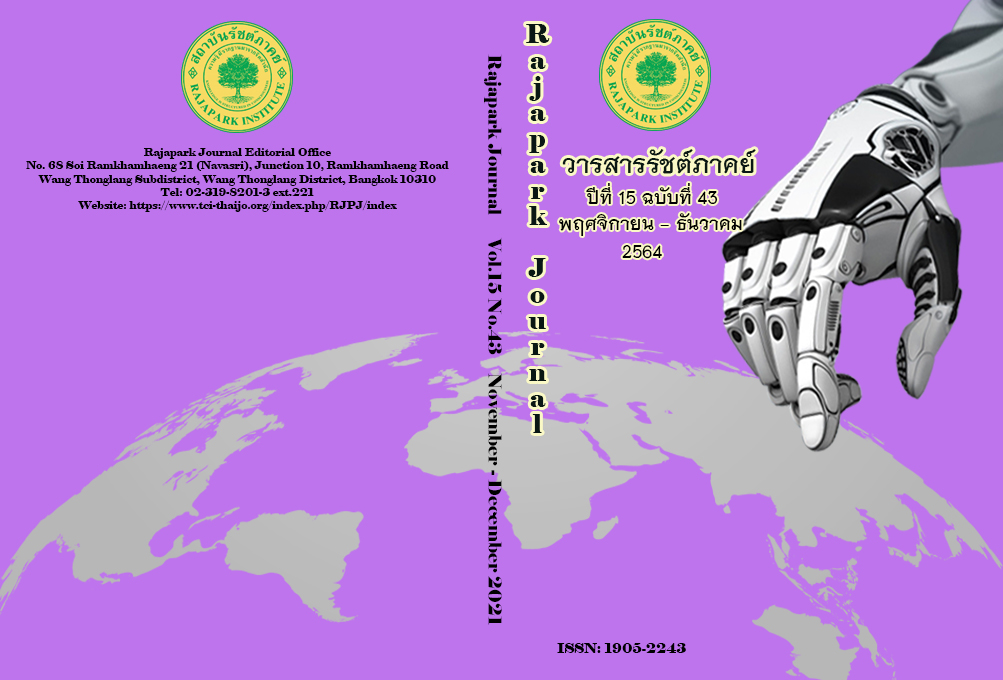The Relationship Between Transformational Leadership of Management to the Job Satisfaction and Organizational Engagement of Employees of Thai Credit Retail Bank Public Company
Main Article Content
Abstract
The objectives of this survey research were 1) to study the transformational leadership of executives for the organization; 2) to study job satisfaction and employee engagement and 3) to study the relationship between transformational leadership of executives with job satisfaction and organizational engagement. The sample used in this research was 306 employees of Thai Credit Retail Bank Public Company Limited, Statistics were used to mean, standard deviation, and Pearson's simple correlation coefficient analysis. The results showed that: 1) the transformational leadership of the executives for the ideological influence organization had the highest mean of 3.93; 2) the job satisfaction and organizational engagement of the employees were at a high level by task responsibility with the highest mean of 4.05 at a high level and 3) the transformational leadership of executives and job satisfaction of employees overall had a high relationship with job satisfaction and the correlation between transformational leadership and organizational commitment at a middle level.
Article Details
Views and opinions appearing in the Journal it is the responsibility of the author of the article, and does not constitute the view and responsibility of the editorial team.
References
Bass, B. M., & Avolio, B. J. (1994). Improving Organizational Effectiveness through Transformational Leadership. Sage Publications, Inc.
Burns, J. M. (2010). Leadership. Harper Perennial Modern Classics.
Chongwisan. R. (2005). Structural Relationships Between Leadership, Emotional Intelligence, and Organizational Citizenship Behaviors. Faculty of Social Sciences, Kasetsart University.
Dechkanya, J. (2021). The Transformational Leadership Affecting the Organizational Effectiveness: A Case Study of Bangkadi Industrial Park, Pathum Thani Province. Journal of Humanities and Social Sciences Review (JHSSR). 23(1), 163-180.
Hesselbein, F., & Goldrsmith, M. (2006). The Leader of the Future 2: Vision, Strategies and Practices for the New Era. Jossey-Bass.
Imandin, L., Bisschoff, C., & Botha, C. (2014). A Model to Measure Employee Engagement. Problems and Perspectives in Management, 12(4-2), 520-532.
Klaywong, C., & Pungnirund, P. (2020) The Influences of Transformational Leadership Organizational Innovation and Change Management on Private Hospital Performance in Thailand. Journal of Social Science and Buddhistic Anthropology, 5(4), 127-144.
Krejcie, R. V., & Morgan, D. W. (1970). Determining Sample Size for Research Activities. Educational and Psychological Measurement, 30(3), 607–610.
Oke, A., Munshi, N., & Walumbwa, F. O. (2009). The Influence of Leadership on Innovation. Processes and Activities. Organizational Dynamics, 38(1), 64-72.
Pantharit, N. (2014). The Relationship Between Transformational Leadership of School Administrators and Organizational Commitment of Teachers in Secondary Schools under the Secondary Education Service Area Office 7(Master of Education, Educational Administration). Burapha University.
Sawangsook, C. (2560). Transformational Leadership Style of School Administrators Affecting Teachers’ Job Satisfaction(Master of Education, Educational Administration). Rambhai Barni Rajabhat University.
Sripipat S. (2013). Leadership. Chiangrai: Chiangrai Rajabhat University.


